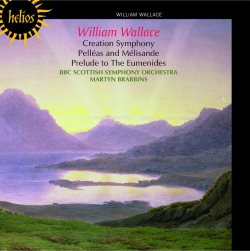|

Support us financially by purchasing this disc from |
|
|
|
|
|
William WALLACE (1860-1940)
Prelude to The Eumenides (1893) [10:40]
Pelléas and Mélisande Suite (1897) [15:46]
Creation Symphony (1896/99) [47:05]
BBC Scottish Symphony Orchestra/Martyn Brabbins
rec. 6-7 June 1997, Henry Wood Hall, Glasgow, UK
HYPERION HELIOS CDH55465 [73:32]
This is a reissue from 2000 of three of William Wallace’s orchestral works
originally recorded to form part of Hyperion’s The Scottish
Romantics series.
A late starter in his formal music education Wallace initially qualified
as an ophthalmic surgeon and was nearly thirty when he entered the Royal
Academy of Music, London as a student.
For his Prelude to The Eumenides (1893) Wallace turned to Greek
mythology and The Eumenides which is the third part of Aeschylus’s
great trilogy, the Oresteia. It was August Manns who conducted its
first performance at the Crystal Palace, London in 1893. I expected that
Wallace’s scores would be strongly influenced by Liszt; instead they
reminded me of early Tchaikovsky such as the tone poems The Tempest
and Marche Slave. I found the writing lacking in distinction with a
sameness and want of memorable invention. Even so there's plenty of
spirit and a reasonable attempt is made at creating a sense of warmly
atmospheric drama.
Maurice Maeterlinck’s symbolist drama ‘Pelléas and Mélisande’ inspired
several composers including Debussy and Sibelius. Wallace wrote his
incidental music to Pelléas and Mélisande in 1897. The suite was
introduced at the Tower, New Brighton, near Liverpool in 1900 with the
composer conducting. Only three of the five movements are played here which
it seems is the format that Wallace preferred. With its restrained opening
the first piece The Love of Pelléas and Mélisande gradually builds
up into a warm and passionate intensity. Following on is the attractive and
virtuous Spinning Song which is folk-dance infused, light music.
The appealing final piece The Death of Mélisande is
crammed full of anguish.
Lasting forty-seven minutes, the Creation Symphony in C sharp
minor is the most substantial work here. It was commenced in 1896 during the
early period of the composer's relationship with the sculptress
Ottilie MacLaren (later to be his wife) who had studied with Rodin. A
committed Christian, Wallace was inspired by his belief in God’s act of
creation. He also drew on his interest in numerology. For those interested
in this sort of thing a detailed explanation of Wallace’s use of numerology
is given in the booklet notes. The work was first performed in 1899 at New
Brighton and then at Bournemouth.
Characteristic of Wallace, the opening movement is warmly atmospheric and
richly dramatic. The heavy brass climaxes are extremely well done even if
the music feels familiar and lacks originality. Evoking a nocturnal scene
with a clear and star-lit sky the Andantino has an undertow of
mystery. Towards the end I sense that dawn is finally breaking through.
Inspired by the might of the sea the Allegro has an unsettling
quality and the bold and triumphant Finale feels warmly atmospheric
with numerous dramatic episodes.
The BBC Scottish Symphony Orchestra respond to Martyn Brabbins’ conducting
with fresh and dedicated performances, although, at times the vitality and
tension could have been stronger. The essay in the booklet by John Purser is
informative and the sound quality is to a high standard.
For those interested in British music and those looking to explore less
known repertoire this re-issue should greatly appeal.
Michael Cookson
|



 All Nimbus reviews
All Nimbus reviews








